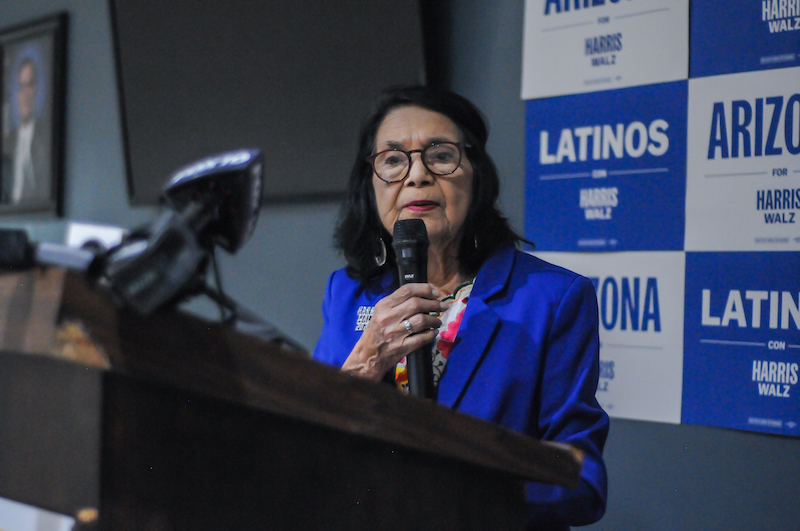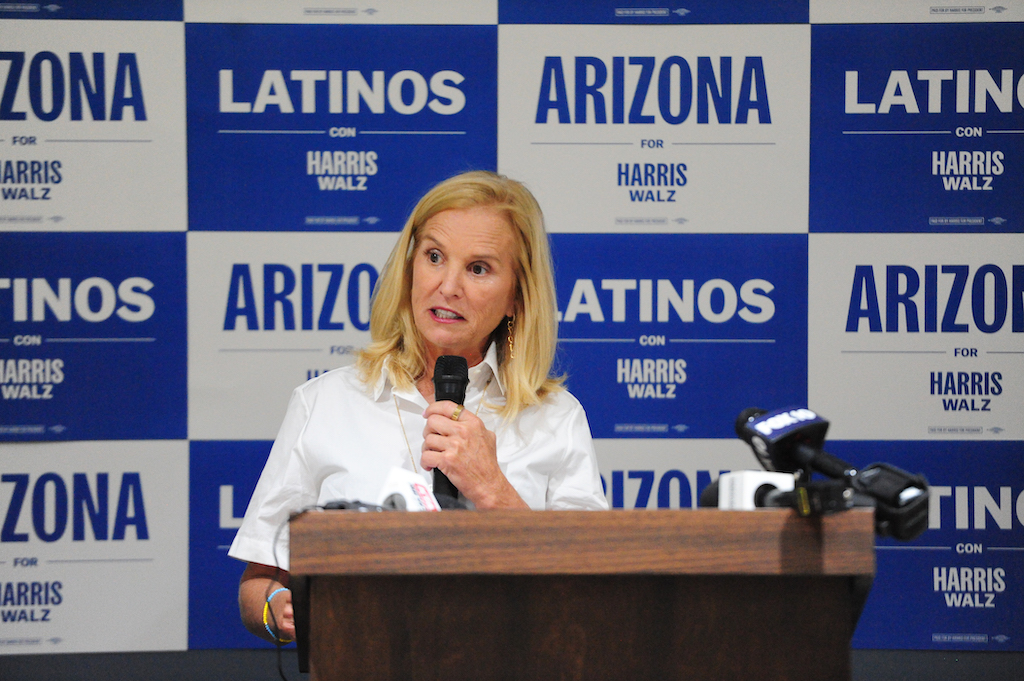(Phoenix, Arizona) — In the 2024 U.S. presidential election, the prominent Kennedy surname has reverberated through both major parties, creating a unique dynamic in the political landscape. Recent events have underscored how the Kennedy legacy, represented by Robert F. Kennedy Jr. (RFK Jr.) and his sister, Kerry Kennedy, is being harnessed to influence the electoral battle.
On August 19, 2024, RFK Jr. made headlines by suspending his campaign in key swing states, a strategic retreat that set the stage for his subsequent alliance with former President Donald Trump. This dramatic pivot, announced during a televised address and later reinforced at a Trump rally in Glendale, Arizona, has significant implications for the election’s dynamics. RFK Jr.’s endorsement of Trump represents a notable shift, bringing his vocal anti-establishment stance into the fold of Trump’s right-wing populism.
Related → A revival in Arizona: Kamala Harris ignites democratic momentum
In response, the Harris-Waltz campaign quickly pivoted to leverage another member of the Kennedy family. Kerry Kennedy, a prominent human rights activist and lawyer, was mobilized to counteract her brother’s alignment with Trump. The Harris-Waltz campaign brought Kerry Kennedy to Arizona for a press conference at Teamsters Local Union No. 104 in Phoenix, where she was joined by Dolores Huerta, a revered figure in labor and civil rights advocacy. The press conference was a strategic move designed to bolster the campaign’s position on labor rights and to draw a stark contrast with Trump’s agenda.

The involvement of the Kennedy family in the 2024 presidential election has introduced both strategic opportunities and potential pitfalls for the major political parties. On the Democratic side, Kerry Kennedy’s high-profile endorsement and collaboration with labor leader Dolores Huerta offer a powerful boost to the Harris-Waltz campaign’s focus on labor rights and social justice. However, this approach also risks alienating grassroots supporters who may view the emphasis on political dynasties as a distraction from substantive policy issues.
For the Republicans, RFK Jr.’s endorsement of Donald Trump brings a dramatic flair and potential appeal to disaffected voters, but it also raises concerns about ideological cohesion and the possible backlash from traditional party members. Evaluating these dynamics is crucial for understanding how the Kennedy family’s involvement could shape the electoral landscape. Let’s analyze them in more detailed
Pros for the Democratic Party
Reinforcement of labor and human rights messaging: By highlighting Kerry Kennedy and Dolores Huerta, the Harris-Waltz campaign effectively reinforced its commitment to labor rights, wage increases, and cost-of-living concerns. This aligns with their broader strategy to appeal to union voters and working-class families who may feel alienated by Trump’s policies.
Family legacy appeal: The Kennedy name continues to carry significant weight in American politics. Utilizing Kerry Kennedy, a well-known advocate for human rights, helps tap into the emotional and historical resonance of the Kennedy legacy, potentially energizing the Democratic base and appealing to undecided voters.
Contrasting with Trump’s policies: Kerry Kennedy’s presence offers a direct rebuttal to Trump’s Project 2025, which proposes measures that could undermine labor organizing and increase financial burdens on working families. This contrast can sharpen the campaign’s message and mobilize voters concerned about economic and social justice.
Cons for the Democratic Party
Kennedy Controversies: While the Kennedy name is iconic, it is not without its controversies and historical baggage. Some voters may perceive the use of the Kennedy legacy as a token gesture rather than a genuine commitment to reform.
Potential alienation: The focus on high-profile figures like Kerry Kennedy may alienate grassroots activists and ordinary voters who feel disconnected from the celebrity-centric approach of modern politics.
Pros for the Republican Party
Strategic Realignment: RFK Jr.’s endorsement of Trump can attract disaffected voters who resonate with his anti-establishment stance. His shift may also bolster Trump’s image as a champion of populist causes, appealing to those disillusioned with the current political system.
Media attention: The dramatic nature of RFK Jr.’s campaign suspension and subsequent endorsement ensures substantial media coverage, which can enhance Trump’s visibility and potentially sway undecided voters who are drawn to the spectacle of high-profile political shifts.
Cons for the Republican Party
Ideological Discrepancies: RFK Jr.’s previous positions on various issues, including his environmental and anti-vaccine stances, may create friction with mainstream Republican voters and undermine the party’s message cohesion.
Potential for Backlash: The association with RFK Jr. could provoke backlash from traditional Republican voters who view his shift as opportunistic or insincere, potentially causing internal discord.
The involvement of the Kennedy family in the 2024 election illustrates the strategic maneuvers both parties are employing to maximize their electoral advantages. While the Democratic Party seeks to leverage Kerry Kennedy’s advocacy to solidify its labor and social justice positions, the Republican Party benefits from the media spotlight generated by RFK Jr.’s dramatic political moves.
The effectiveness of these strategies will ultimately hinge on how well each party can integrate these high-profile figures into their broader campaign narratives.
View more PHOTOS of the press conference
This article is for journalistic purposes only and aims to provide information to the public about the U.S. elections. Barriozona Magazine does not endorse or promote any candidate, party, or specific political agenda. Our goal is to offer an impartial analysis of the data and facts surrounding the electoral process in 2024 in the United States.
© 2024 - 2025, Eduardo Barraza. All rights reserved.





